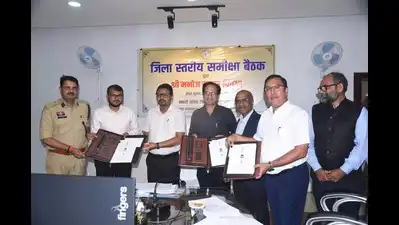
Historic MoU to Tackle Urban Waste, Boost Clean Energy, and Create Thousands of Jobs
Bilaspur | June 15, 2025 — In a landmark move that could redefine waste management and green energy in Chhattisgarh, Bharat Petroleum Corporation Limited (BPCL) signed a ₹100 crore tripartite MoU with the Bilaspur Municipal Corporation and the Chhattisgarh Biofuel Development Authority for the establishment of a Compressed Bio Gas (CBG) plant in Kachhar, Bilaspur.
The plant, to be built over 10 acres of municipal land, will process 150 metric tonnes of solid urban waste per day and generate 5 to 10 metric tonnes of CBG daily, addressing the dual crises of urban waste and clean energy deficit.

Turning Waste into Opportunity
This project represents a rare synergy between sustainable energy, employment generation, and urban sanitation. The CBG produced will directly fuel biogas-powered electric vehicle stations and other infrastructure in Koni, promoting low-emission public transport and eco-friendly mobility.
Alongside this, the by-product of the process organic fertilizer will be distributed to local farmers, promoting organic agriculture and reducing reliance on chemical inputs.
Numbers That Matter
- ₹100 Crore Investment
- 150 MT/day Urban Waste Utilized
- 5–10 MT/day CBG Generated
- 30,000 Employment Opportunities Annually
- ₹1 Crore/year GST Revenue to State
“This isn’t just about fuel; it’s about a future where waste is no longer a burden, but a resource,” said a senior official from the Biofuel Development Authority. “It’s a model we hope will replicate across India.”
A Step Toward Sustainable Cities
The MoU is part of BPCL’s broader CSR commitment to renewable energy and environmental stewardship. Bilaspur, a city long struggling with urban waste mismanagement and rising pollution, could now become a national model in clean energy transformation.
However, questions remain about the transparency in waste collection systems, public participation, and the timeline for operational readiness of the project. Will these ambitious plans survive the typical bureaucratic delays and land-use controversies?
The SanvaadGarh Viewpoint:
As thousands in Chhattisgarh grapple with waste-laden streets and mounting unemployment, this project brings a much-needed ray of hope. But whether this hope translates into real change depends not just on the plant’s completion, but on who truly benefits from the energy and the employment it generates.


Be the first to comment